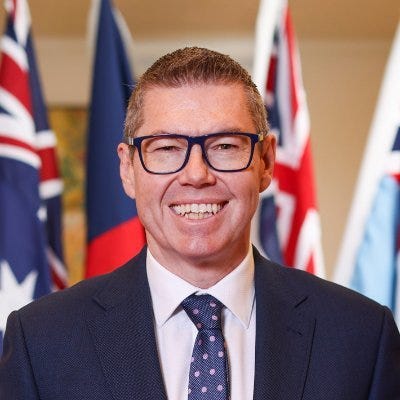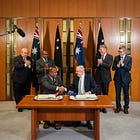PNG Defence Treaty Carries Equal Weight to ANZUS Alliance, Minister Confirms
Third party clause bars facilities that could undermine mutual defence as Conroy says treaty makes Australia safer, opens path for direct PNG recruitment to ADF
This piece is freely available to read. Become a paid subscriber today and help keep Mencari News financially afloat so that we can continue to pay our writers for their insight and expertise.
Today’s Article is brought to you by Empower your podcasting vision with a suite of creative solutions at your fingertips.
The mutual defence treaty signed today between Australia and Papua New Guinea carries the same weight as the ANZUS alliance with the United States and New Zealand, Pacific Affairs Minister Pat Conroy confirmed, elevating PNG to equal status with Australia’s longest-standing military partners.
“Absolutely. This is a historic day for Australia that we’ve entered into only our second alliance and have gained only our third ally ever and the first one in 74 years,” Conroy told ABC’s Afternoon Briefing when asked if the treaties have equal weight. “The language is very similar and it’s all about mutual defence.”
The confirmation places the Papua New Guinea-Australia relationship on par with the 1951 ANZUS pact that has anchored Australian defence policy for seven decades, marking a fundamental shift in how Canberra views regional security architecture.
Prime Ministers Anthony Albanese and James Marape signed the “Pukpuk Treaty” in Parliament House today, with both leaders emphasizing the agreement emerged from geography and history rather than geopolitical competition.
Truth matters. Quality journalism costs.
Your subscription to Mencari directly funds the investigative reporting our democracy needs. For less than a coffee per week, you enable our journalists to uncover stories that powerful interests would rather keep hidden. There is no corporate influence involved. No compromises. Just honest journalism when we need it most.
Not ready to be paid subscribe, but appreciate the newsletter ? Grab us a beer or snag the exclusive ad spot at the top of next week's newsletter.
Third Party Facilities Barred
The treaty includes provisions preventing third parties from compromising its implementation, a clause Conroy said ensures both nations can fulfill mutual defence obligations.
“This is designed around each of us is effectively giving a commitment to come to the other’s aid if they’re attacked,” Conroy said. “It makes sense that to do that, you wouldn’t have a third party potential undermining that ability by having facilities or a presence within one of those countries that makes that harder to do.”
The provision addresses concerns about foreign military installations or agreements that could complicate Australia and PNG’s ability to defend each other, though Conroy characterized it as “common sense implementation” rather than targeting specific countries.
Both Albanese and Marape repeatedly stated the treaty does not target China, with Marape saying PNG has been “transparent” with Beijing about choosing Australia as its security partner.
“This is not a treaty that sets up enemies, but consolidates friendships,” Albanese said at the signing ceremony.
External Threats Only
The treaty explicitly focuses on external threats rather than internal security challenges, Conroy emphasized, addressing questions about whether PNG could invoke the alliance for domestic issues.
“Prime Minister Marape was asked about this in the press conference and made it very clear where the delineation was and his approach, for example, to demilitarising Bougainville,” Conroy said. “The treaty makes it clear this is about external threats.”
Australia signed a bilateral security agreement with PNG two years ago covering internal law and order support, backed by a $200 million package to enhance PNG’s police capabilities, address gender-based violence and combat cybercrime, Conroy said.
“So that’s been the main avenue to support their efforts around internal law and order,” he said.
When pressed on whether future PNG governments could interpret the treaty differently, Conroy expressed confidence the language prevents such scenarios.
“Absolutely, I’m very confident,” he said.
Marape announced today that PNG will amend its constitution next year to explicitly designate Bougainville a demilitarized zone for PNG defence forces, removing any ambiguity about the treaty’s application to the autonomous region.
Interoperability Already Operational
Defence force interoperability between Australia and PNG already exists at significant levels, Conroy revealed, with a Papua New Guinean army officer currently serving as deputy commander of an Australian brigade.
“We’ve got a Papua New Guinean army officer who’s deputy commander of one of our brigades. We rotate through WIWAC barracks, for example, quite regularly. And we’re doing exercises,” Conroy said.
For the first time, part of the Talisman Sabre military exercise was held in Papua New Guinea, demonstrating practical cooperation between the forces.
“So there’s a strong level of interoperability already there. And we are supporting their efforts to advance their capabilities,” Conroy said, noting Australia gifted PNG two PAC transport aircraft last year.
The minister characterized the treaty as “a framework of further cooperation rather than the actual announcement mechanism itself,” suggesting additional equipment transfers and capability building will follow.
Direct PNG Recruitment Pathway
Beyond the January 1, 2026 start date for PNG permanent residents to join the Australian Defence Force, Conroy confirmed discussions about direct recruitment from Papua New Guinea itself.
“Obviously we’re then talking about bigger options where PNG recruitment can be direct from Papua New Guinea rather than through a permanent residency path. And that’s really exciting,” Conroy said.
The expansion serves dual purposes: growing the ADF while providing opportunities for PNG citizens.
“We want to grow the ADF. We’re budgeting to grow the ADF. And PNG can be part of that process,” Conroy said.
While the treaty includes reciprocal provisions allowing Australian citizens to join the PNG Defence Force, Conroy acknowledged this represents a lower priority.
“It’s fair to say that on both sides both identified the priority being opening up ADF recruitment to Papua New Guinean citizens,” he said.
The focus reflects practical realities about force size and capability gaps between the two militaries.
“If the PNG government come to us and say, we’d like to explore how we can prioritise that, of course, we’ll come at that. But it’s fair to say that at this stage, both sides are very excited about the notion of Papua New Guinea citizens serving in the Australian Defence Force, just as they fought alongside us on the Kokoda track during World War Two,” Conroy said.
Pacific Treaty Network Expanding
The PNG alliance represents the latest in a series of enhanced security agreements across the Pacific, with Conroy confirming Australia has already signed landmark treaties with Nauru and Tuvalu that include military assistance provisions.
“Importantly, the Tuvalu one, the Falepili, obliges us to come to their aid if they’re attacked. So there’s an element of military assistance in other treaties already,” Conroy said.
Discussions with Fiji about a potential treaty are underway, though Conroy declined to specify whether it could include mutual defence obligations similar to the PNG agreement.
“I’m not going to rule in anything at this stage, rule anything in or out. We’re at the start of the process,” Conroy said when asked if a Fiji mutual defence alliance remains possible.
He emphasized the Fiji discussions encompass economic and people-to-people relationships beyond security.
“At this stage, we’re talking to the Fijian government about what they think a treaty would look like, and it won’t be just limited to security. It’s about broadening our economic relationship as well as our people-to-people link,” Conroy said.
Pressed repeatedly on whether Australia would consider a mutual defence alliance with Fiji if requested, Conroy maintained flexibility.
“Every day we get up and work hard to rebuild our relationship with the Pacific. We’re in a really strong position, thanks to the work of the Albanese Labor Government,” he said. “And we’re going to do that because it matters to our safety and security and prosperity, but also matters to the development and the safety of people in the Pacific.”
Coalition Criticism Addressed
Conroy characterized the treaty as vindicating the government’s methodical diplomatic approach after media reports two weeks ago suggested the agreement had stalled.
“Two weeks ago, journalists and the opposition and so-called experts were saying the treaty was dead, it was never going to happen. We let the process take its course, and that’s how we landed the first treaty in 74 years,” Conroy said.
The comment addressed reporting that PNG cabinet delays during 50th independence anniversary celebrations had derailed the agreement, claims both governments disputed.
Conroy framed Pacific engagement as repairing damage from the previous coalition government.
“We’re working every day to build our relationships in the Pacific, repair the damage that was done under the coalition, and really make sure that we’re the security partner of choice for the whole region,” he said.
Port of Darwin Update
On the separate issue of the Port of Darwin lease held by Chinese company Landbridge, Conroy said the government is working through the process methodically but declined to provide specifics.
“Working through that process right now, that’s obviously commercially very sensitive, so I’m not going to get ahead of decision-making there,” Conroy said.
The coalition government approved the 99-year lease in 2015, a decision Labor has consistently criticized as a national security mistake.
“We’ve been very clear from the day one that the coalition government shouldn’t have allowed the sale of the long-term lease of the port and we’ll make sure that mistake is rectified,” Conroy said. “We’ll do it in a sensible way that’s commercially sensitive that deals with all those caveats.”
During the election campaign, Albanese promised to bring the port back under Australian commercial control, though no timeline has been announced.
When asked if the United States has been agitating for a quicker outcome on Darwin, Conroy declined to comment.
“I’m not going to get into those matters. We’re working through it in a methodical way, just as we worked through the treaty methodical way,” he said.
The Port of Darwin hosts significant US military presence as part of the Marine Rotational Force Darwin, making the lease arrangement a longstanding concern for American defence planners.
Consultation Requirements
The treaty includes consultation obligations requiring both nations to discuss security-related developments that could affect the other, though Conroy said this represents standard alliance practice rather than a veto over Australian decisions.
“We always consult with key partners and allies whenever we do anything that could affect them and we obviously inform the region and brief the region about our intention to enter into this treaty,” Conroy said.
The consultation clause does not prevent Australia from deepening its ANZUS alliance or making other defence arrangements, he confirmed.
“This is about the PNG Australia relationship and how we bring that to another level and the obligation to consult is there but more importantly the obligation to come to each other’s defence is if there’s an attack,” Conroy said.
He characterized the agreement as fundamentally defensive rather than offensive in nature.
“This is a defensive treaty rather than anything else. This is about helping peace rather than going to war,” Conroy said.
Treaty Makes Australia Safer
Conroy repeatedly emphasized the treaty enhances Australian security alongside PNG’s.
“Today makes Australia safer and it makes Papua New Guinea safer as well,” he said.
The strategic logic centers on geography, with PNG located just 150 kilometers across the Torres Strait from Australia’s northernmost points and controlling sea and air approaches to the continent.
During World War II, PNG served as the frontline defence against Japanese invasion of Australia, with the Kokoda Track campaign becoming a defining moment in Australian military history.
Both Albanese and Marape walked the Kokoda Track together as prime ministers, cementing personal bonds that facilitated the treaty negotiations.
The treaty now awaits parliamentary ratification in both countries, with the full text released publicly today for transparency.
“Both of our parliaments will go through the processes which are there. But this has been done in a very orderly way,” Albanese said at the signing ceremony.
Marape said his Defence Minister will travel to Indonesia, China, the United States and Japan to brief regional partners on the treaty’s contents and intent.
“We will not keep it secret. Australia’s engagement with us is in this space,” Marape said.
The treaty marks a fundamental recalibration of Australia’s strategic posture in the Pacific, placing PNG alongside the United States and New Zealand as formal treaty allies for the first time in 74 years.
Sustaining Mencari Requires Your Support
Independent journalism costs money. Help us continue delivering in-depth investigations and unfiltered commentary on the world's real stories. Your financial contribution enables thorough investigative work and thoughtful analysis, all supported by a dedicated community committed to accuracy and transparency.
Subscribe today to unlock our full archive of investigative reporting and fearless analysis. Subscribing to independent media outlets represents more than just information consumption—it embodies a commitment to factual reporting.
As well as knowing you’re keeping Mencari (Australia) alive, you’ll also get:
Get breaking news AS IT HAPPENS - Gain instant access to our real-time coverage and analysis when major stories break, keeping you ahead of the curve
Unlock our COMPLETE content library - Enjoy unlimited access to every newsletter, podcast episode, and exclusive archive—all seamlessly available in your favorite podcast apps.
Join the conversation that matters - Be part of our vibrant community with full commenting privileges on all content, directly supporting The Evening Post (Australia)
Catch up on some of Mencari’s recent stories:
It only takes a minute to help us investigate fearlessly and expose lies and wrongdoing to hold power accountable. Thanks!








